
Brodiaea, also known by the common name cluster-lilies, is a monocot genus of flowering plants.
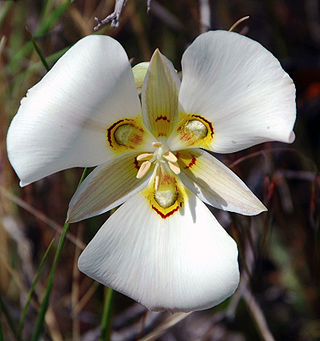
Calochortus is a genus of flowering plants in the lily family. The group includes herbaceous, perennial and bulbous species, all native to North America.

Lupinus nanus, the sky lupine, field lupine, dwarf lupin, ocean-blue lupine or Douglas' annual lupine, is a species of lupine native to the western United States. It is found natively in California, Nevada, and on Steens Mountain in eastern Oregon. It tends to grow on slopes and in open or disturbed areas below 1300 meters.

Quercus × macdonaldii, formerly Quercus macdonaldii, with the common names MacDonald's oak and Macdonald oak, is a rare hybrid species of oak in the family Fagaceae.

Calochortus splendens is a North American species of mariposa lily known by the common name splendid mariposa lily.
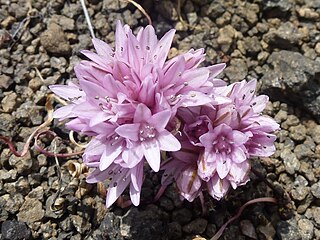
Allium parvum is an American species of wild onion known by the common name small onion. It is native to the western United States where it is a common member of the flora in rocky, dry areas in mountainous areas, especially in talus at elevations of 1,200–2,800 m (3,900–9,200 ft). It is widespread in California, Nevada, Oregon and Idaho, and also reported from western Utah and from extreme southwestern Montana
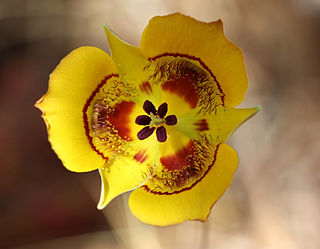
Calochortus clavatus is a species of mariposa lily known by the common name clubhair mariposa lily. It is endemic to California where it is found in forests and on chaparral slopes.

Calochortus catalinae is a species of mariposa lily known by the common name Santa Catalina mariposa lily.

Calochortus umbellatus is a flowering plant in the lily family found only in California in the United States. The common name for this species is Oakland mariposa lily or Oakland star-tulip.

Calochortus amabilis is a species of the genus Calochortus in the family Liliaceae. It is also known by the common names Diogenes' lantern, yellow globe-tulip, golden globe-tulip, yellow globe lily, golden fairy lantern, golden lily-bell, Chinese lantern, and short lily.

Calochortus dunnii is a rare species of flowering plant in the lily family known by the common name Dunn's mariposa lily.

Calochortus elegans is a species of flowering plant in the lily family known by the common name elegant Mariposa lily, cat's ear, elegant cat's ears or star tulip. It is native to the western United States from northern California to Montana.

Calochortus excavatus is a species of flowering plant in the lily family known by the common name Inyo County star-tulip.

Calochortus kennedyi is a North American species of flowering plant in the lily family known by the common name desert mariposa lily.

Calochortus monophyllus is a North American species of flowering plants in the lily family known by the common name yellow star-tulip.
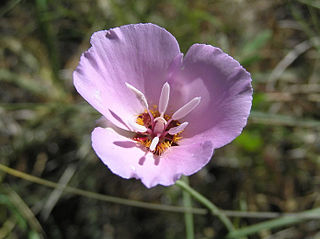
Calochortus palmeri is a species of flowering plant in the lily family known by the common names Palmer's mariposa lily and strangling mariposa.

Calochortus pulchellus is a rare species of flowering plant in the lily family known by the common name Mt. Diablo fairy-lantern or Mount Diablo globelily.
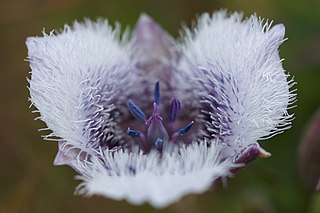
Calochortus tolmiei is a North American species of flowering plant in the lily family known by the common names Tolmie's star-tulip and pussy ears. It was discovered by and named for Dr. William Fraser Tolmie.

Calochortus uniflorus is a species of flowering plant in the lily family known by the common names Monterey mariposa lily and large-flowered star-tulip. It is native to western Oregon and to California as far south as San Luis Obispo County. It grows in moist areas, such as meadows, in coastal hills and lower-elevation mountains. Most of the populations are found in the Coast Ranges, but some occur in the Cascades and in the foothills of the Sierra Nevada.

Calochortus longibarbatus is a species of flowering plant in the lily family with the common names long-haired star-tulip and longbeard mariposa lily. It is native to Oregon, Washington, and northern California, where it grows in the forest and woodlands of the mountains.





















